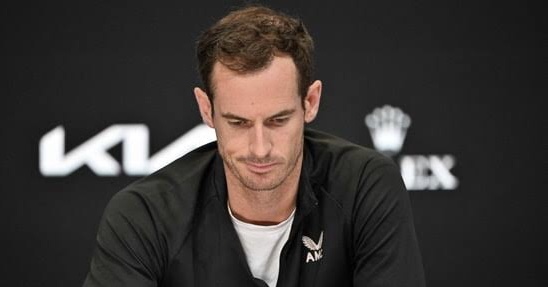Andy Murray’s Biggest Regrets: 5 Mistakes That Shaped His Career

Andy Murray is one of the most successful and resilient tennis players of his generation. Known for his unwavering determination, mental fortitude, and incredible skill, Murray has amassed a career full of triumphs, including multiple Grand Slam titles and Olympic gold medals. However, like any top athlete, his path to success has not been without its missteps and regrets. In a career marked by both highs and lows, Andy Murray has openly reflected on several mistakes that, in hindsight, may have altered the trajectory of his career.
Here are five of Andy Murray’s biggest regrets, which, while they may have been setbacks at the time, ultimately contributed to the growth and development of one of tennis’s greatest players.
1. Underestimating the Importance of His Mental Health Early On
For many years, Andy Murray was known for his intense focus and mental toughness on the court. But behind that exterior, he struggled with the pressure and stress that came with being at the top of his game. In his early career, Murray did not fully address the mental and emotional challenges of competing at the highest level, which at times led to frustration and underperformance in key moments.
Murray has been open about his struggles with anxiety and depression, especially during the more difficult periods of his career. Looking back, he admits that he didn’t always prioritize his mental health, which sometimes affected his performance and overall well-being. It wasn’t until he faced some of his lowest points that he realized how essential it was to take care of his mind, not just his body.
“I’ve had moments in my career where I let myself get overwhelmed,” Murray said. “I used to think it was all about the tennis, but I’ve learned that taking care of my mental health is just as important as training or preparing for a match.”
This regret, while a painful lesson, has driven Murray to become an advocate for mental health awareness in sports, reminding other athletes that taking care of one’s mind is essential for long-term success.
2. The 2016 Australian Open Final: A Missed Opportunity
In 2016, Andy Murray was in the midst of one of his best years, having just reached No. 1 in the world rankings. One of his most painful regrets, however, was his loss in the Australian Open final to Novak Djokovic. After a series of intense rallies and a hard-fought battle, Murray ultimately fell short, losing in five sets.
While Djokovic was undoubtedly at his peak during this time, Murray has often spoken about how he felt the final was within his grasp. “I definitely felt that was my best chance to win the Australian Open,” Murray later reflected. “I had everything lined up, but I just wasn’t able to pull it off.”
Murray has expressed frustration over not capitalizing on the opportunities he had in that match, particularly in key moments where he could have been more aggressive or focused. The loss to Djokovic was a significant turning point in Murray’s career, but it also fueled his drive to improve his game, ultimately leading to more successful years.
3. Overworking and Ignoring His Physical Health
Andy Murray’s playing style is characterized by a relentless work ethic and an ability to grind through long, demanding rallies. However, this came at a cost. Early in his career, Murray pushed his body to its limits, and his intense training and match schedules took a toll on his physical health.
In 2017, Murray’s hip injury—later diagnosed as a career-threatening condition—would ultimately define the latter part of his career. The relentless schedule and overtraining led to long-term damage to his hip, and Murray was forced to undergo surgery in 2018. It was a difficult period, during which he had to reconsider his approach to the game.
In hindsight, Murray admits that he might have been too focused on his game and not enough on his body’s recovery needs. “I’ve made the mistake of overloading myself in the past. I didn’t always listen to my body, and that definitely led to a lot of injuries,” he admitted. “It took a major injury for me to realize the importance of taking time for recovery and respecting the limits of my body.”
This painful realization has since helped Murray become more aware of the need for a balanced approach to training, pushing his physical boundaries but also ensuring proper recovery and rest.
4. Choosing to Stick with a Single Coaching Style for Too Long
Throughout his career, Andy Murray has worked with several coaches, each bringing a unique approach to his game. However, early in his career, Murray stuck with a particular coaching style for longer than perhaps was optimal. He was known for working with Ivan Lendl, a coach who was immensely successful but often pushed Murray to work extremely hard, sometimes to the detriment of his overall development.
Murray’s relationship with Lendl was marked by great successes, but there were moments when he felt that the coaching style wasn’t allowing him to fully express himself on court. Reflecting on this period, Murray admitted, “There were times when I felt I was trying to be something I wasn’t, instead of finding my own voice as a player.”
It wasn’t until later in his career that Murray began to embrace a more flexible approach to coaching, understanding that finding the right balance and style was essential for his continued growth. While Lendl helped Murray achieve tremendous success, Murray’s journey has shown the importance of evolving his coaching team and methods as his game developed.
5. The Constant Comparison to Federer, Nadal, and Djokovic
As part of the “Big Four” alongside Roger Federer, Rafael Nadal, and Novak Djokovic, Andy Murray has often found himself under constant scrutiny and comparison. This trio of players achieved immense success throughout their careers, and for much of Murray’s early career, he was often seen as the “fourth wheel” in a race for tennis supremacy.
For many years, Murray allowed the comparisons to get to him, feeling pressure to measure up to his legendary peers. While he eventually broke free from these external expectations—winning multiple Grand Slams and reaching No. 1 in the world—he acknowledges that the constant comparison hindered his mental approach during crucial years of his career.
“I used to get frustrated when I was compared to the others, especially when I wasn’t winning as many Grand Slams,” Murray revealed. “But over time, I’ve realized that I have my own path, and my success is different from theirs. I had to stop focusing on the comparisons and start focusing on my own journey.”
Murray’s growth as a player and person came when he finally learned to embrace his own strengths and not measure his success solely against others.
Conclusion
Though Andy Murray’s career has been full of spectacular achievements, these five regrets highlight the challenges and growth he has experienced along the way. From addressing his mental health struggles to learning the importance of physical recovery and evolving his coaching strategies, Murray’s mistakes have ultimately shaped him into the champion he is today. As he continues to play, his story serves as a reminder that even the greatest athletes must learn from their missteps, using them to fuel future success and personal growth.



